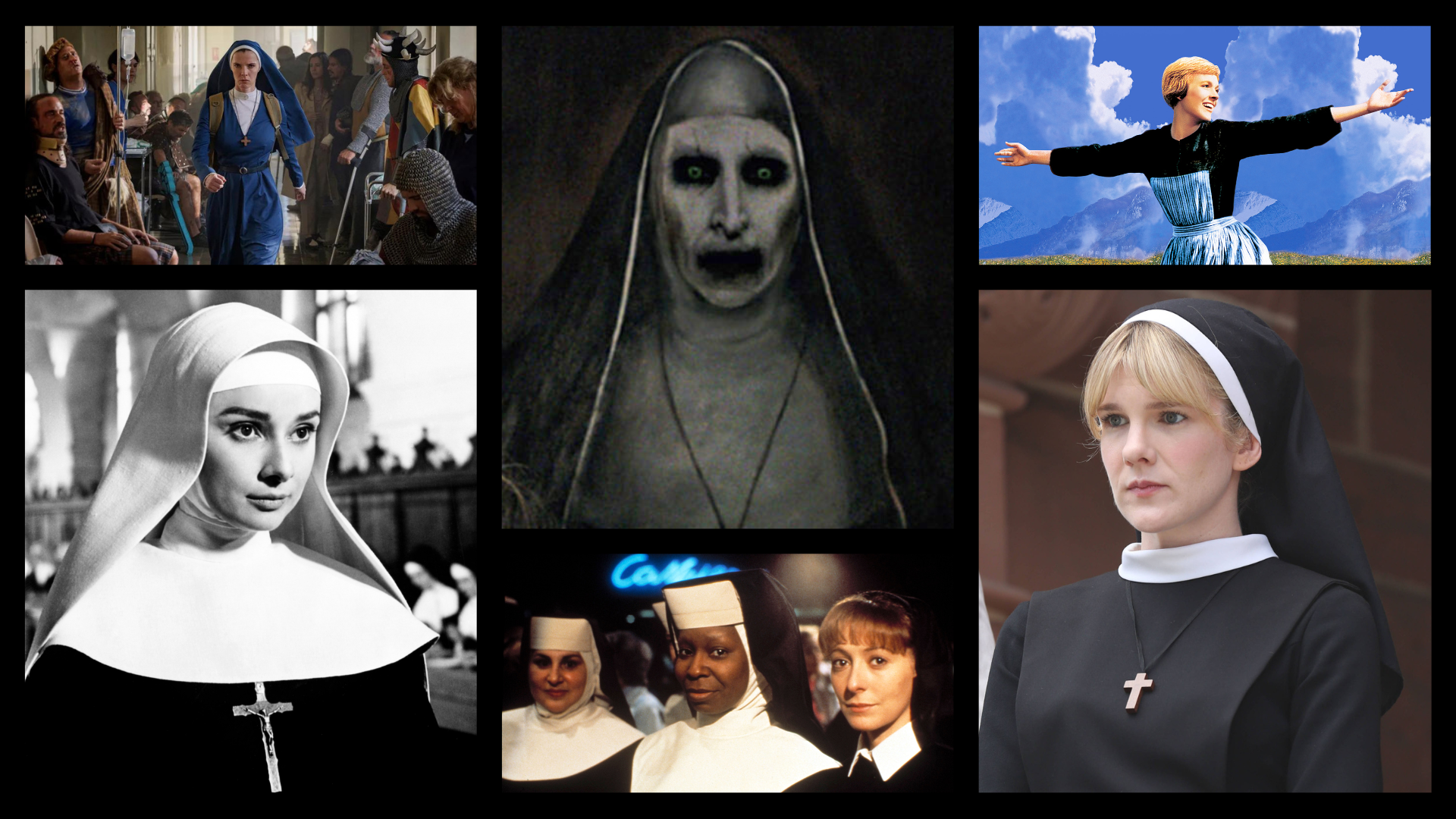[Editor’s note: This story was originally published September 2023. It has since been updated ahead of the release of “Immaculate.”]
In the real world, nuns typically lead simple, quiet lives. Taking vows of chastity and obedience in order to fully devote themselves to God, the average nun — be she Roman Catholic, Anglican, Lutheran, or some other denomination — gives up her worldly possessions in exchange for the pursuit of greater spiritual purpose, often spending her life in a monastery or convent and focusing on prayer, charity, and schooling. For some, that’s a fulfilling path, but it’s also maybe not the most interesting story to watch.
And yet onscreen, nuns can be whatever the director wants them to be. They can be the singing, lovable anti-Nazis in “The Sound of Music.” They can be the bawdy and hilarious R&B superstars in “Sister Act.” In some films, like Paul Verhoeven’s “Benedetta,” they spit in the face of those vows of chastity to engage in some sacrilegiously steamy antics. In other films, like “The Conjuring” spinoff film “The Nun,” all that pious energy is a mere front for a sinful heart, as the spiritual sister of that film’s title (a literal demon in disguise) unleashes horrific acts of violence and cruelty on would-be lambs of the Lord-turned-sacrificial slasher fodder.
Although there’s a decent library of films about priests and monks and even popes, there’s something about nuns that makes them particularly rich subjects for filmmakers. Perhaps it’s the iconic habits they wear: an instantly recognizable symbol of faith and goodness that can be deployed sincerely or twisted (and even fetishized) into something more complicated. Or it could be their almost universal association with Roman Catholicism, one of the most melodramatic and intense branches of Christianity — and therefore the one most often depicted on film.
There’s also the obvious gender element. Nuns have a complicated relationship between subservience and independence; in denominations like the Catholic Church, the nun — the only female “leadership” role — is traditionally seen as the bottom of the broader hierarchy. Historically, becoming a nun was sometimes the only option for a woman beyond being a wife and mother, and gave her the opportunity to live away from men. Some of the great films about religion examine the strange space nuns occupy and the sacrifices required by women to pursue their spiritual calling.
With “Immaculate” now in theaters as Sydney Sweeney’s own contribution to the genre, let’s look back on all of the films and TV shows that have given the sisters a chance to shine. The best nun films and shows contain the fizzy comedy of “Sister Act,” the shocking horrors of “The Devils,” and the wild lunacy of “Mrs. Davis.” Have faith that this list will lead you to a great new watch. Entries are listed chronologically.
With editorial contributions from Mark Peikert and Alison Foreman.
-
‘The Bells of St. Mary’s’ (dir. Leo McCarey, 1945)

Image Credit: Courtesy Everett Collection It didn’t win Best Picture like ‘Going My Way,’ Bing Crosby’s first film as hip young singing priest Father Chuck O’Malley, but ‘The Bells of St. Mary’s’ is arguably the superior movie. That’s in no small part to the addition of Ingrid Bergman as Sister Mary Benedict, the dedicated but stubborn nun O’Malley clashes with in his new assignment at St. Mary’s parish. Despite their rivalry, the two must team up to find a way to save the school from being shut down. Bergman shines in the role, giving Benedict a grace and dignity that ensures she’s never a stick in the mud to Crosby’s free spirit. —WC
-
‘Black Narcissus’ (dir. Michael Powell and Emeric Pressburger, 1947)

Image Credit: Courtesy Everett Collection When ‘Black Narcissus’ premiered in 1947, it shocked audiences with its gorgeous use of color and decadent sets — and cinematographer Jack Cardiff and art director Alfred Junge both won Oscars for their work creating the film’s Himalayan setting. The beauty onscreen, from blooming pink flowers to glistening jewels, is vivid and lush, and for the film’s main characters — a small convent of Anglican nuns invited to start a school by the Indian government — it proves dangerously seductive.
In Michael Powell and Emeric Pressburger’s masterpiece, Sisters Clodagh (Deborah Kerr) and Ruth (Kathleen Byron) can make vows of chastity, but even promises to God can’t change the fact that they’re woman of flesh and blood, with cravings mere spirituality is unable to fulfill. As the months wear on and the thrills of their new surroundings reduce the convent to their base instincts, both Clodagh and Ruth lust after cynical local British agent Mr. Dean (David Farrar, managing to make khaki shorts sexy). The older Clodagh, scarred by past heartbreak, refuses to act on her reciprocated attraction despite the unhappiness she feels, but the younger, unstable Ruth surrenders to her longing and descends into insanity. Described by Martin Scorsese as one of cinema’s first erotic films, ‘Black Narcissus’ contains a surprisingly strong anti-colonialist critique that’s aged well (minus its use of brownface), but is primarily a ravishing psychological tale about the eternal conflict between duty and desire, and the futility of trying to repress the latter. —WC
-
‘The Nun’s Story’ (dir. Fred Zinnemann, 1959)

Image Credit: Courtesy Everett Collection Two years before she played Holly Golightly in ‘Breakfast at Tiffany’s,’ Audrey Hepburn scored an Oscar nomination for her performance as Sister Luke in this quintessentially studio-era 1959 drama — in the best way possible. As a nun who left behind her wealthy family to take vows only to find her work in the Congo and then in Nazi-occupied Belgium forcing her to reconsider, Hepburn is typically excellent (no one played spine of steel quite as gracefully or forcefully) but the whole film is a handsomely mounted production that has been unjustly forgotten. Directed by Fred Zimmerman (‘From Here to Eternity’) and co-starring Peter Finch and British acting legends Edith Evans and Peggy Ashcroft, ‘The Nun’s Story’ offers a fresh facet to Hepburn’s talent that many casual fans might not know. —MP
-
‘Viridiana’ (dir. Luis Buñuel, 1961)

Image Credit: Courtesy Everett Collection Luis Buñuel is at his most audacious with this 1961 drama about a young woman named Viridiana, who is forced to visit her reclusive uncle before taking her vows — a trip that, spoiler alert, ultimately prevents her from becoming a nun at all. What unfolds was decried as blasphemous by many (including the official newspaper of the Vatican) and outright banned from release in Spain by Franco. But it also won the Palme d’Or and is now routinely included on lists of the greatest films ever made. A true nun film? Not quite but in Viridiana’s story lies something profoundly true about religion and sacrifice. —MP
-
‘The Sound of Music’ (dir. Robert Wise, 1965)

Image Credit: ©20thCentFox/Courtesy Everett Collection Beloved musical ‘The Sound of Music’ is a film about getting the hell out of a nunnery and getting into the big, broad, sexy arms of Christopher Plummer. But it still manages to treat its spiritual sisters with respect and joy. Julie Andrews, in her defining role, is the free-spirited Austrian sister-in-training Maria, whose carefree nature makes her a problem the kindhearted Mother Abbess (Peggy Wood) is simply unable to solve.
To teach her some responsibility, Abbess sends Maria off to be the governess for the seven children of retired naval captain Georg Von Trapp, an assignment that proves complicated when it turns out Plummer’s captain is a world-class hottie. But when Maria attempts to run away from the mutual attraction the two share and take her vows of chastity, the wise Abbess accurately pegs her for being horny as hell and sweetly encourages her to pursue her true feelings with the inspirational ballad ‘Climb Ev’ry Mountain.’ The lovely, supportive bond between Maria and her Mother Superior would be enough for the film to establish itself as one of the great nun films, but that’s not even getting into the film’s third act pivot into anti-Nazi rebellion. Have you ever seen any cinematic priests steal car parts from Nazi vehicles in order to help their former trainee, her hunky husband, and seven stepkids escape the dangers of the Third Reich? I think not. —WC
-
‘The Devils’ (dir. Ken Russell, 1971)

Image Credit: Courtesy Everett Collection ‘The Devils’ is Ken Russell’s most controversial film — and that’s saying a lot. Starring Vanessa Redgrave and Oliver Reed and rated X upon its initial release, this 1971 adaptation of Aldous Huxley’s non-fiction book about a 17th-century priest burned at the stake for accusations of witchcraft remains shocking today. How else to describe a movie in which a fraudulent exorcism culminates in a nun orgy in which the sisters masturbate with a crucifix (a full two years before ‘The Exorcist,’ no less!)? But good luck getting your hands on a copy; years of edits and censorship have resulted in multiple iterations and though it was streaming on the Criterion Channel as recently as 2019, it’s not available at the moment. —MP
-
‘Sister Act’ (dir. Emile Ardolino, 1992)

Image Credit: ©Buena Vista Pictures/Courtesy Everett Collection ‘Sister Act’ — perhaps the most iconic nun movie of the last 30 years — was initially written for Bette Midler to star in. But after she turned it down (‘My fans don’t want to see me in a wimple,’ she sniffed), Whoopi Goldberg stepped into what would become one of the defining roles of her storied career. Sister Mary Clarence (nee Deloris van Cartier, a lounge singer on the run from the mob) is brash, endearing, and tough. But she’s no match for the stern sisters at St. Catherine’s Parish in San Francisco. From there the plot becomes secondary; there will be action and danger, but mostly this is a perfectly executed fish-out-of-water story about the world’s least likely nun and the power of music. As if that wasn’t enough, it all set the stage for ‘Sister Act 2.’ —MP
-
‘Sister Act 2: Back in the Habit’ (dir. Bill Duke, 1993)

Image Credit: ©Buena Vista Pictures/Courtesy Everett Collection Deloris is back — and this time, she arrives in San Francisco to offer assistance as a Las Vegas sensation! But that won’t be enough to save the St. Francis Academy from being torn down. In order to save it, Deloris and the sisters from the original must — oh, who cares about the plot when this remains one of the all-time best sequels ever thanks to vibes and music? Critically disparaged upon release, ‘Sister Act 2’ is low-key superior to the original in that we have the best cover of ‘Joyful Joyful’ ever filmed and a Lauryn Hill performance that led to countless artists pursuing a music career. As usual, the critics were wrong, but God (and ‘Sister Act 2’ fans) forgives. —MP
-
‘Doubt’ (dir. John Patrick Shanley, 2008)

Image Credit: ©Miramax/Courtesy Everett Collection There’s apparently a right answer to the central question of ‘Doubt,’ but director John Patrick Shanley, who adapted the film from his Pulitzer-winning play of the same name, is tight-lipped about what it is. Whether or not Father Flynn (Phillip Seymour Hoffman), the hip new priest at a 1964 Roman Catholic school, is preying on the school’s only Black student remains a mystery to everyone who isn’t Shanley and the actors playing Flynn. With that crucial information forever obscured, the audience is in the same position as nun Sister Aloysius (Meryl Streep) — turning over the evidence in their heads as they attempt to find an answer to Flynn’s ambiguous actions and shrouded past. But that mystery also becomes a battleground in which a hundred different issues in the Catholic hurch are explored: the subservience expected from nuns by their male counterparts, the conflict between conservative attitudes and its attempted reformers, racism in organized religion, and the degree to which potential abusers are believed and protected. The cast of the film, which also includes Amy Adams and Viola Davis in one of her best roles, are all uniformly riveting, doing the meaty, queasy subject matter complete justice. —WC
-
‘American Horror Story: Asylum’ (FX, 2012)

Image Credit: ©FX Networks/Courtesy:Everett Collection / Everett Collection As the strict Sister Jude and child-like Sister Mary Eunice, Jessica Lange and Lily Rabe play a salacious game of demonic hot potato in Ryan Murphy’s ‘American Horror Story: Asylum.’ It’s the second outing of the horror anthology for FX and, as with every other season of this god-forsaken show, the plot and execution are all over the place. From the eerie cheeriness of ‘The Name Game’ to that sultry red slip (red underwear beneath black-and-white robes isn’t just for porn anymore, kiddos!), the nuns’ bewildering battle against the devil leaves something to be desired as a cohesive tale of demonology. But as far as lasting evil nun imagery goes, ‘Asylum’ brilliantly bottles the tyrannical terror too many Catholics will remember from their childhoods. —AF
-
‘Ida’ (dir. Paweł Pawlikowski, 2013)

Image Credit: Everett Collection / Everett Collection A powerful window into Polish history, ‘Ida’ uses its title character’s faith as an entrance into broader themes about generational scars. Agata Trzebuchowska plays Anna, a young woman living in 1960s Poland on the verge of taking her vows as a nun. But when her prioress sends her to meet her aunt Wanda (Agata Kulesza), a former communist resistance fighter, Anna discovers her real name is Ida, and her parents were Jews murdered during Poland’s occupation by Germany during World War II. On the precipice of taking her vows, Ida embarks with Wanda on a journey to learn more about her family ties, while torn between her past and her desire to retain her Christian faith. The film treats Ida’s journey with empathy and care, and Trzebuchowska gives a subtle and powerful performance as the young woman goes through her spiritual reckoning. —WC
-
‘Benedetta’ (dir. Paul Verhoeven, 2021)

Image Credit: Courtesy of Guy Ferrandis/SBS Productions To a born provocateur like Paul Verhoven, a historical figure like Benedetta Carlini is pure catnip. An Italian nun in the Catholic Church who claimed to experience mystical visions, Carlini engaged in a sexual affair with one of her fellow nuns and was imprisoned by the papacy when the scandal was discovered.
Verhoeven’s ‘Benedetta’ has only a glancing relationship with the real history of Carlini, but the “Showgirls” director still gives us an outrageously sexy and near sacrilegious combination of spirituality and sensuality. While that all makes ‘Benedetta’ sound a bit like a dirty joke, a sexy nun soft porn filled with dildos carved out of Virgin Mary statuettes it is not (at least not entirely). Verhoeven’s work is always sexy and smart, and ‘Benedetta’ — with the magnetic Virginie Efira in the lead — makes a compelling case that sexual freedom and spiritual faith don’t have to be mutually exclusive. —WC
-
‘Mrs. Davis’ (Peacock, 2023)

Image Credit: Elizabeth Morris/Peacock It’s often said that nuns are married to Jesus, but in Tara Hernandez and Damon Lindelof’s wild and wonderful Peacock series ‘Mrs. Davis,’ that’s taken to an audaciously literal place. In one of the most jaw-dropping moments in recent TV memory, Betty Gilpin’s Sister Simone reveals to her ex-boyfriend Preston (Jake McDorman) that her ‘husband’ Jay is the actual Jesus Christ, who she visits in a diner and romances whenever she prays. If that was the only insane wrinkle in ‘Mrs. Davis” storyline, it would still be one of the most thrillingly weird projects in the nun canon, but the eight-part series doesn’t rest there — sending Simone on a wild goose chase across the planet in pursuit of the Holy Grail to shut down the titular all-knowing app that has conquered the world and led to the death of her magician father. The show constantly teeters on the line between masterpiece and disaster, which is part of what makes its ambitious story about spirituality and connection in the modern age of technology so thrilling. No artificial intelligence would ever be capable of creating a show as singular as ‘Mrs. Davis.’ —WC
-
‘The Nun II’ (dir. Michael Chaves, 2023)

Image Credit: Warner Bros. Pictures The Conjuring Universe introduced Valak — a towering demon most frequently taking the shape of an ashen, yellow-eyed nun — all the way back in ‘The Conjuring 2.’ That’s still the best movie the evil sister has appeared in, with the 2016 sequel boasting the most scares per minute and one of the best overarching stories in James Wan’s exorcism-obsessed franchise.
But ‘The Nun II’ is the strongest overall showcase for Valak as an entity, offering the fallen angel an opportunity to toy with its helpless victims in a game of cat-and-mouse that crosses multiple countries and ends in a campy tribute to transubstantiation not to be forgotten. Actress Bonnie Aarons has brought an ever-lasting magnetism to the role for years, but it’s only with this latest chapter that the sinister sister truly feels like Conjuring’s biggest bad. —AF
‘The Nun II’ Review: The Conjuring Universe Delivers a Tightly Crafted (Painfully Pro-Catholic) Second Coming






